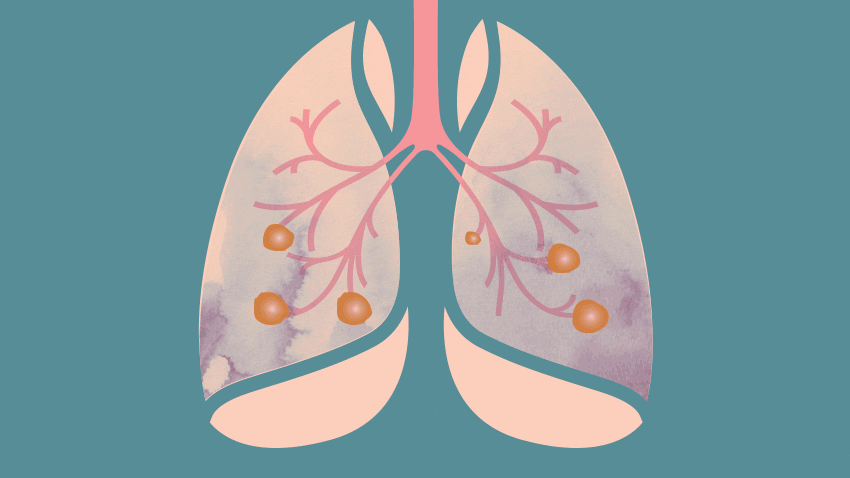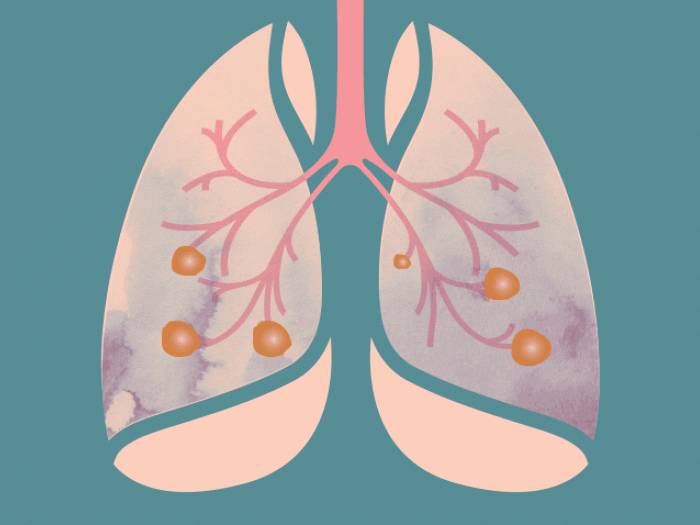A 600-patient randomized clinical trial supports pembrolizumab and chemotherapy as a first-line treatment
2:24 PM
Author |

A large, randomized immunotherapy clinical trial continues to show improved overall survival and progression-free survival in advanced lung cancer patients, researchers reported at this year's American Society for Clinical Oncology meeting.
LISTEN UP: Add the new Michigan Medicine News Break to your Alexa-enabled device, or subscribe to our daily audio updates on iTunes, Google Play and Stitcher.
The update on the KEYNOTE-189 trial provides nearly two years data on use of the immunotherapy drug pembrolizumab in combination with platinum-based chemotherapy as a first-line treatment for metastatic non-small cell lung cancer.
"The primary takeaway is that we saw continued benefit, even with longer follow-up," says Shirish M. Gadgeel, MBBS, Mary Lou Kennedy Research Professor in Thoracic Oncology at the University of Michigan Rogel Cancer Center. Gadgeel serves on the steering committee for KEYNOTE-189 and participated with a global team on two prior studies.
"Sometimes what happens with longer follow-up is that the patients who had initially benefited start to relapse and the overall benefit may significantly decrease — that was not the case here."
The researchers found patients who received chemotherapy and pembrolizumab — a checkpoint inhibitor marketed under the brand name Keytruda — had a median overall survival of 22 months, compared to 10.7 months for those who received chemotherapy alone.
The primary takeaway is that we saw continued benefit, even with longer follow-up.Shirish M. Gadgeel, MBBS
An even better measure, says Gadgeel, is one that scientists call a hazard ratio. It provides the cumulative risk over the course of an entire study, rather than at the single point represented by the median survival time.
"The hazard ratio was around .5 for both survival and progression-free survival," Gadgeel says. "So the risk of progressing or the risk of dying for a patient at any point along the survival curve was reduced by approximately 50% in the patients that received pembro with chemotherapy as opposed to patients who received chemotherapy alone. And, at least in terms of lung cancer, that's a substantial benefit."
The second major finding was that benefits were seen to survival and progression-free survival across subsets of patients with different levels of expression of a protein called PD-L1, which is involved in helping cancer cells hide from immune cells.
The two-year follow-up results also included an additional measurement — called PFS2 — that examines survival after second-line treatment.
MORE FROM MICHIGAN: Sign up for our weekly newsletter
"Again we found that patients who received chemo and pembro had improved survival," Gadgeel says. "It's another way of demonstrating that the benefit is not transient but sustained."
Immunotherapy attempts to activate the patient's immune system to fight cancer. This is the first time an immunotherapy drug has been combined with first-line chemotherapy to treat nonsquamous non-small cell lung cancer, which constitutes about 85 percent of all lung cancers.
"We've never seen these types of results in patients with advanced lung cancer," Gadgeel noted when the initial results were announced last year. "To have [some stage 4 lung cancer] patients who have not had any progression of cancer and are not receiving any treatment is truly remarkable."
Disclosure: Gadgeel was compensated for participating in advisory boards organized by Roche/Genentech, Takeda, AstraZeneca, Boehringer-Ingelheim, Bristo Myers-Squibb and Novocure.

Explore a variety of healthcare news & stories by visiting the Health Lab home page for more articles.

Department of Communication at Michigan Medicine
Want top health & research news weekly? Sign up for Health Lab’s newsletters today!





